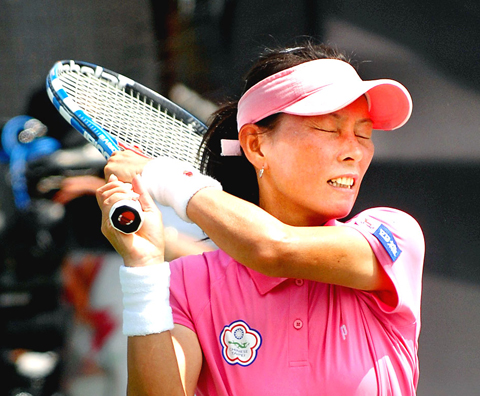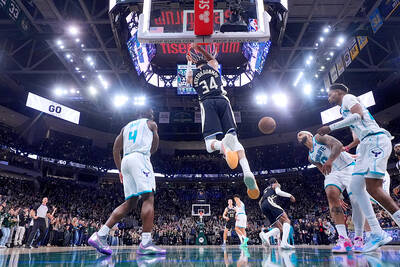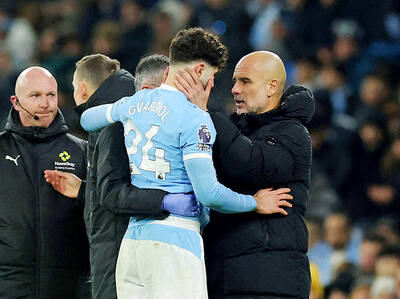The Williams sisters might have pioneered the sibling trend in the world of women’s tennis, but Taiwan’s own Ho Chiu-mei and Ho Chiu-hsiang are also strutting it in style.
Hailing from a small township in Chiayi, the 51-year-old and 47-year-old sisters are Taiwan’s medal hope in the Deaflympics women’s tennis doubles.
Thursday’s breezy 6-1, 6-0 triumph over their Japanese opponents Yachiyo Abe and Mizu Tsujioka, both 24, opened the door to the gold when the sisters do battle with 32-year-old Verena Fleckenstein and 18-year-old Heike Albrecht of Germany today.

PHOTO: CNA
“I promise to perform my best to secure the gold for Taiwan,” Ho Chiu-mei told a pre-match press conference, saying confidently her age would not detract from her skills.
Being the youngest in a family of five children, throughout her adult life Ho Chiu-mei hoped she would be the one to escape the family curse — gradual hearing loss, but it came as a crushing below when her hearing started to deteriorate in her 30s when her co-workers had to shout in order to communicate with her.
Losing her hearing also meant losing self-confidence, she said.
Thanks to the constant encouragement and persistent nudging from family and friends, Ho Chiu-mei decided to shake off the blues by again taking up the love her life — tennis — and when she did, it was as if she had never stopped.
Ho had her first taste of tennis in sixth grade when her physical education teacher Chang Yue-han, who doubled as a tennis coach, thought her long legs and long arms provided the ideal physique for an athlete.
Chang also convinced a few of Ho’s classmates to take up the sport and soon enough the team of small-town girls was winning local competitions and eventually triumphed at the national championships.
Ho Chiu-mei recalled that when Chang recruited them, none of the players had ever seen a racket before and the school did not even have a tennis court for them to practice on. A military general who lived nearby later decided to build a make-shift court on his property to accommodate the team.
Fast forward to the 1990s and Ho Chiu-mei’s hard work paid off as she made a name for herself in the tennis world when she was the national champion eight years running. In 1994, she brought honor to Taiwan by winning a bronze at the 1994 Asian Games in Hiroshima, Japan.
Just as she was standing at the pinnacle of her career, her hearing began to fail her to the point she could not hear when the racket hit the ball. A disheartened Ho Chiu-mei decided to drop out and start a family.
For years, Ho Chiu-mei would play casually, but never dreamed of returning to the sport as a professional.
When Taipei won the bid to host the Deaflympics, the Chinese Taipei Sports Association of the Deaf lobbied hard for her to participate. Eventually, she said yes and even started encouraging other deaf people to take up the sport.
“Tennis has brought much color to my life, even if it means I have to stand on a silent court,” she once said.
Ho Chiu-mei was not about to play the Deaflympics alone, however, at least not without her older sister Ho Chiu-hsiang.
Unlike Ho Chiu-mei, who started playing as a child, the older sister did not take her first swing of a racket until she was in her 30s.
Now 51, the older Ho said she picked up tennis two decades ago only because she wanted to keep fit and have fun at the same time.
The more she played, the more she liked the sport. Despite her age, Ho Chiu-hsiang was beating all the younger players with her famous backhand slice.
Even her younger sister was impressed with her skills, physical endurance and most of all her tenacity. So impressed that Hou Chiu-mei recommended that the association put her in the women’s doubles — as her partner.
When asked how she felt about her chance of a gold medal, in particular when facing players some 30 years younger than her, Ho Chiu-hsiang displayed her confidence and said: “There is a saying that old pieces of gingers are the spiciest ones. This is my first time and probably my last time to participate in an international event and I don’t think age is a problem. I will do my best to bring honor to our country.”

BOUNCING BACK: Antetokounmpo had just returned from an eight-game injury absence last month, leading the Milwaukee Bucks to their third win in four games Giannis Antetokounmpo threw down the game-winning dunk with 4.7 seconds remaining to lift the Milwaukee Bucks to a 122-121 victory over the Charlotte Hornets and grab a slice of NBA history on Friday. The Bucks trailed by as many as 16 on their home floor, but Antetokounmpo scored 12 of his 30 points in the final quarter to help seal the win in a frantic finish that saw five lead changes in the final 45.7 seconds. The two-time NBA Most Valuable Player (MVP) added 10 rebounds and five assists. It was his 158th regular-season game with at least 30 points, 10 rebounds and

For the first time in almost 36 years, a Parisian derby will be played in French soccer’s top flight when reigning champions Paris Saint-Germain FC take on the nouveau riche Paris Football Club (PFC) today. Not one of the players involved in today’s match — PFC’s 38-year-old third-choice goalkeeper Remy Riou is almost certainly not going to be involved — was born the last time there was a Parisian derby in Ligue 1. That was on Feb. 25, 1990, when Moroccan midfielder Aziz Bouderbala scored a brace as Racing Paris 1 beat PSG 2-1 at the Parc des Princes home that

Stan Wawrinka’s 40-year-old legs did not let him down over three-plus hours in his first singles match of a farewell tour yesterday. Three-time Grand Slam singles champion Wawrinka beat Arthur Rinderknech of France, who is ranked 29th to Wawrinka’s 157th, 5-7, 7-6 (5), 7-6 (5). The match went 3 hours, 16 minutes. Wawrinka last month announced that this year would be his last on the ATP tour. “Today was a tough battle ... it’s amazing to come here for the first time, to have so much support,” Wawrinka said yesterday. “Twenty years on tour, you kind of always play in the same place

Manchester City have confirmed defender Josko Gvardiol suffered a broken leg in Sunday’s 1-1 draw with Chelsea at the Etihad Stadium. Gvardiol was one of two City centerbacks who went off injured in the second half, along with Ruben Dias, before Enzo Fernandez scored a stoppage-time equalizer for the visitors. The draw left second-placed City six points behind English Premier League leaders Arsenal. City, announcing Gvardiol sustained a tibial fracture to his right leg, added in a statement issued on Monday: “The defender will have surgery later this week and assessment remains ongoing to ascertain the full extent of the